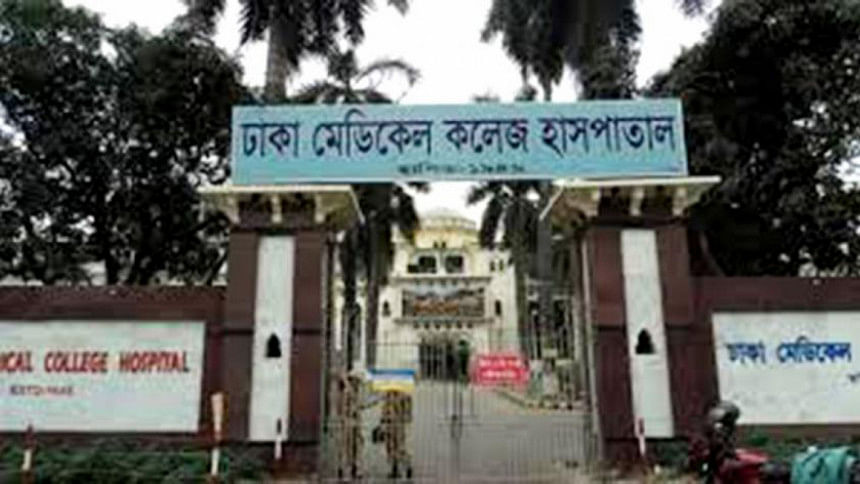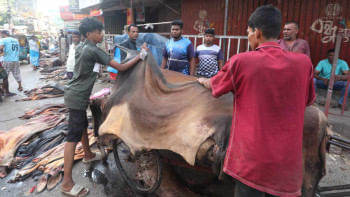Doctors, nurses and staff dangerously exposed

Four doctors of Dhaka Medical College Hospital were sent to home quarantine yesterday after all four handled a coronavirus patient without any protective gear for over a week.
However, none of the nurses or ward helpers, who actually touched the patient or administered intravenous medication, were sent into quarantine.
Furthermore, no step was taken to quarantine the other patients of the ward where the Covid-19 patient was admitted.
"The patient who tested positive for coronavirus was admitted to the medicine ward around eight or nine days ago, with flu-like symptoms," said Professor Mujibur Rahman, head of the Department of Medicine at the DMCH.
The patient had returned from a foreign country, but the doctor requested that the country not be named to maintain the patient's privacy.
"The patient was treated for their symptoms and given dialysis. On Tuesday, we found out that his symptoms suggest that he has coronavirus. So, we called the Institute of Epidemiology, Disease Control and Research (IEDCR) and they came to collect his samples," he said.
The patient's results came back positive yesterday.
A board immediately sat down to discuss the next steps, and the four doctors who dealt with the patient most were sent on home quarantine.
Other doctors who may have come in contact with the patient were offered the same preventive measure as well. Many hospitals, including the DMCH, in Dhaka are woefully equipped to handle coronavirus patients and this exposes these key health workers essential for dealing with the outbreak. Many health workers are not getting essentials like life-saving masks, gloves, sanitising alcohol, and liquid hand soap.
"We are at risk because there is not enough protection. If patients come like this, their treatment will be difficult. Protect us. If we are healthy and well, we can treat patients. If we fall sick, the patients will not get treated either," Mujibur said.
He pleaded with the general population, "If any patient has coronavirus-like symptoms, please go to the hospitals that can deal with such patients. Please don't come here."
NO PROTECTION AT OTHER PUBLIC HOSPITALS EITHER
Even hotels have equipped their guards with infrared thermometers to check the temperature of incoming guests and offices have installed hand-washing facilities. But public hospitals, which see the highest number of sick patients in the city, lag deplorably behind in preventive measures.
None of the hospitals are checking the temperatures of people entering the hospital, and most public hospital units do not have mandatory hand-washing facilities.
Nor is there much concern for the health professionals treating the patients. Forget full-body gear and personal protective equipment (PPE) -- even basic protective equipment like masks, gloves, sanitising alcohol, and liquid hand soap are often bought by the doctors and nurses themselves.
This situation was observed on Tuesday, when The Daily Star correspondents visited the National Institute of Diseases of the Chest and Hospital (NIDCH), Bangabandhu Sheikh Mujib Medical University (BSMMU), Sir Salimullah Medical College Hospital (Mitford), Bangladesh Institute of Research and Rehabilitation in Diabetes, Endocrine and Metabolic Disorders (Birdem), Shaheed Suhrawardy Medical College and Hospital, and Mugda Medical College and Hospital.
BSMMU
At one of the nurse's stations between the wards housing neurosurgery patients and dialysis patients at BSMMU, two female nurses said that there is an acute shortage of liquid soap, hexisol, masks, and gloves.
"I bought the mask I am wearing. They usually at least give us rubbing alcohol, but even those have not been provided for weeks as it is short in supply," said a nurse wearing a disposable mask, already thin and frayed from being reused.
The other nurse took out a small bottle of liquid soap from her pocket. "See, I brought this from home. I carry it around in my pocket and use it to keep myself and my patients safe," she said.
On Tuesday, our correspondent observed that several hand-washing stations were being set up outside the building with the outpatient departments -- this basic measure was being taken 10 days after the first coronavirus case in the country was announced, and months after the global outbreak.
None of the other entry-gates of BSMMU were being equipped with such facilities however. This means neither does one need to get their temperature checked, nor wash their hands, before entering the wards, the ICU, and NICU housing critical patients, doctor's chambers, or blood banks.
Birdem
Across the street, a similar situation was found in Birdem. "We have rubbing alcohol, but we do not have masks or any protective suits," said a nurse treating patients of a ward.
The ward was filled to the brim with not just patients but also their families. A common scenario in public hospitals -- families of the patients camped out beside their beds, on the floor. Nobody wore masks.
Similarly, the hospital has not separated the elevators carrying the diabetes patients, who are already immunocompromised, from those to be used by the general public.
Our correspondent observed a ward boy wheeling in an elderly patient with diabetes-induced swollen feet and open sores in an elevator so tightly-packed that there was no space for even a small child.
Nazimul Islam, joint director of Birdem General Hospital, told The Daily Star that it was not possible to screen incoming patients with infrared thermometers. "We see 4,000 outpatients every morning. The queue would stretch to Shahbagh intersection if we did that."
He also said that the lack of masks was due to the global shortage.
"The scary thing is patients are now starting to hide their travel history from us," he said.
SUHRAWARDY
While nurses and doctors at Suhrawardy Hospital were given gloves and disposable masks, they were not given the full-body, full-face protective gear that has become a standard in countries dealing with Covid-19.
"We are working in a situation of risk," said the hospital's director Uttam Kumar Barua.
The hospital has set up a flu corner to screen patients who are afraid that they might have been infected with coronavirus, and only people dealing with these patients have been given PPE.
This has left nurses and doctors of other sections in considerable panic. "I work in the medicine ward. Patients with flu symptoms are all sent to my department. Flu and coronavirus have similar symptoms," said a nurse.
She has reason to fear. Remember the Bahrain-returnee suspected coronavirus patient who ran away from the hospital on March 15? She was the one who dealt with him -- without any protection.
Mitford
Mitford Hospital has not been able to manage full-body protection for their nurses and doctors, said its Director Brig Gen Morshed Rashid.
"We do not even have masks and gloves. We are trying to provide these to emergency cases like surgery, but there is not enough to distribute among the general nurses and doctors," he said. "We have given them cloth masks to wash and reuse."
"I too am going about without wearing a mask," he added.
Meanwhile, since free treatment was offered at government hospitals to mark the birth centenary of Bangabandhu Sheikh Mujibur Rahman, an unusual crowd of patients was found on Tuesday afternoon at the hospital.
With bare hands, on-duty doctors were examining patients at the hospital's emergency department.
"No precautionary equipment is being provided by the hospital authorities. The mask that you've seen on my face was bought by me," said a doctor preferring anonymity.
Expressing concern, he said, "Like me, many other doctors of the hospital feel exposed to coronavirus."
Nobody going into the hospital was being screened for fevers either. "We have not asked the government for infrared thermometers yet, but we might in the future," said the director.
NIDCH
At NIDCH, the main hospital in the city for respiratory diseases, doctors and nurses complained that they were buying their own masks and gloves.
At the outpatient department, none of the doctors and nurses wore masks. Only two ward-helpers wore masks. There were three people sitting at the ticket counters and nobody wore a mask.
Our correspondent peeked into the vacant washroom of the outpatient department -- there was no bar of soap or liquid soap at the sink.
Nobody entering the hospital was being screened for fevers.
Hospital Director Shahedur Rahman told our correspondent, "We will get 200 sets of PPE from the ministry, but even those can be used only once. So, we will have a shortage of protection."
The hospital has dedicated five beds in three rooms to isolate coronavirus patients, should they be needed.
MUGDA HOSPITAL
Mugda Medical College and Hospital is among the multiple hospitals the government is prepping for dealing with coronavirus patients, but they do not have sufficient PPE.
Some 100 beds have been kept reserved in separate places, of which 40 are for coronavirus positive patients and 60 are for suspected coronavirus patients, said Shahid Mohammad Sadiqul Islam, director of the hospital.
However, they only have 10 PPE. Doctors and nurses fear they will run out of protective suits on the first day, should a coronavirus patient be admitted.
Furthermore, a special corner called the coronavirus centre has been made on the ground floor of the hospital for patients who are coming with cough, fever, neck pain, sneezing, and breathing problems, said the director. However, none of the doctors or nurses there have been given PPE.
(Shaheen Mollah, Zyma Islam, Helemul Alam, Mahbub Rahman, and Asif Taasin contributed to the report.)

 For all latest news, follow The Daily Star's Google News channel.
For all latest news, follow The Daily Star's Google News channel. 



Comments